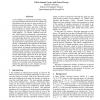Free Online Productivity Tools
i2Speak
i2Symbol
i2OCR
iTex2Img
iWeb2Print
iWeb2Shot
i2Type
iPdf2Split
iPdf2Merge
i2Bopomofo
i2Arabic
i2Style
i2Image
i2PDF
iLatex2Rtf
Sci2ools
121
click to vote
IJCAI
2007
2007
Using Linear Programming for Bayesian Exploration in Markov Decision Processes
A key problem in reinforcement learning is finding a good balance between the need to explore the environment and the need to gain rewards by exploiting existing knowledge. Much research has been devoted to this topic, and many of the proposed methods are aimed simply at ensuring that enough samples are gathered to estimate well the value function. In contrast, [Bellman and Kalaba, 1959] proposed constructing a representation in which the states of the original system are paired with knowledge about the current model. Hence, knowledge about the possible Markov models of the environment is represented and maintained explicitly. Unfortunately, this approach is intractable except for bandit problems (where it gives rise to Gittins indices, an optimal exploration method). In this paper, we explore ideas for making this method computationally tractable. We maintain a model of the environment as a Markov Decision Process. We sample finite-length trajectories from the infinite tree using ...
Artificial Intelligence | IJCAI 2007 | Key Problem | Optimal Exploration Method | Possible Markov Models |
Related Content
| Added | 29 Oct 2010 |
| Updated | 29 Oct 2010 |
| Type | Conference |
| Year | 2007 |
| Where | IJCAI |
| Authors | Pablo Samuel Castro, Doina Precup |
Comments (0)

